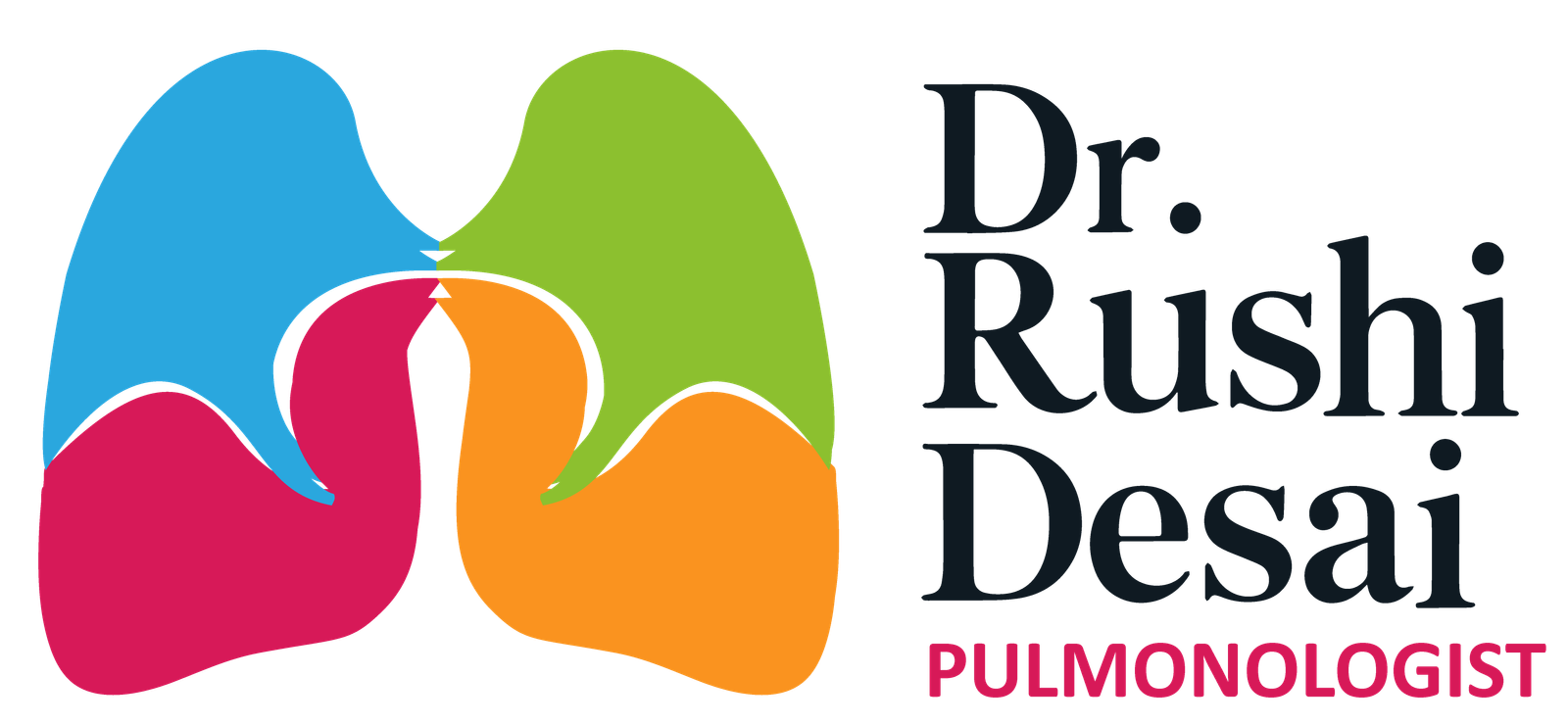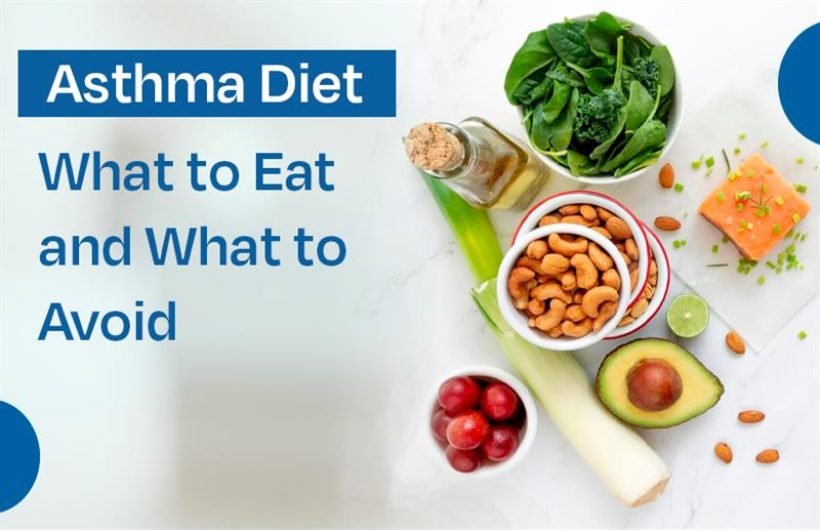Asthma, a chronic respiratory condition that affects millions of people worldwide, can make everyday life challenging. It causes inflammation in the airways, leading to symptoms like wheezing, shortness of breath, and tightness in the chest. Learning the asthma-triggering foods alongside beneficial asthma-relief foods will enable you to control your asthma more efficiently.
This article examines the asthma diet which selects nutrition that promotes lung health along with specific foods to prevent asthma trigger initiation. Getting advice from your local Asthma specialist near you Dr. Rushi Desai will enable you to make dietary decisions that improve your asthma management.
Understanding Asthma and Its Triggers
You need to grasp how particular foods affect asthma symptoms before looking at the asthma diet plan. Asthma attacks may be set off when a person comes in contact with allergens environmental irritants and specific types of foods. The asthma symptoms of dairy products along with processed foods and preservatives may increase but certain antioxidant-rich foods can strengthen the immune system and lower inflammation.
Foods to Eat for Asthma Relief
1. Fresh Fruits and Vegetables
The asthma diet needs to emphasize fresh produce over other food groups. Vegetables and fruits contain vitamins C and E that fight airway inflammation because of their antioxidant properties. The antioxidants present in these foods help both strengthen immune functions and minimize the number of asthma attacks. A healthy asthma diet should include a selection of colorful fruits and vegetables that include the following items:
- Oranges (rich in vitamin C)
- Berries (blueberries, strawberries, and raspberries)
- Carrots and spinach (high in beta-carotene)
- Tomatoes (rich in lycopene)
2. Omega-3 Fatty Acids
Primarily candid change foods incorporating omega-3 fatty acids establish recognized anti-inflammatory characteristics. Your asthma diet will benefit from healthy fats that can decrease airway inflammation and improve breathing along with asthma symptom reduction. Omega-3-rich foods include:
- Salmon
- Flaxseeds
- Chia seeds
- Walnuts
3. Whole Grains
Whole grains such as brown rice, oats, quinoa, and whole-wheat bread are excellent sources of fiber and essential nutrients. These foods are particularly beneficial for those with asthma, as they help maintain healthy lung function and provide consistent energy throughout the day.
4. Magnesium-Rich Foods
Magnesium is an essential mineral that helps relax the muscles in your airways, which can help prevent asthma attacks. Excluding magnesium-rich foods within your asthma diet plan helps your breathing and lung functioning. Several foods contain magnesium in amounts that benefit asthma patients including:
- Spinach
- Almonds
- Pumpkin seeds
- Black beans
5. Herbs and Spices
Several herbs contain anti-inflammatory elements that also function as bronchodilators to improve breathing through widened airway passages. These include:
Ginger serves as a natural substance that minimizes the inflammation of airways.
Turmeric serves as a valuable anti-inflammatory element due to its curcumin component.
Garlic benefits the immune system when consumed because of its anti-inflammatory properties.
6. Water
Maintaining hydration stands as the essential factor for asthma treatment in Ahmedabad. Your body needs hydration because it enables mucus in the airways to become thinner so it can be easily eliminated. Drink a large amount of water daily as cold weather brings dry air that damages lung tissue.
Foods to Avoid with Asthma
Some asthma symptoms respond favorably to food but various other nutritional elements often intensify the condition while worsening its symptoms. You need to know about asthma triggers because they must be removed from your asthma diet meal schedule.
1. Dairy Products
Asthma symptoms often develop when people eat dairy products although such reactions mainly affect those who have dairy sensitivities. Eating milk and cheese along with yogurt triggers mucus increases which will result in breathing obstruction. You should lower your dairy consumption or switch to lactose-free products since dairy seems to worsen your asthma symptoms.
2. Processed Foods
The consumption of manufactured foods with artificial additives preservatives and flavorings among them can cause asthma attacks. The consumption of many foods within the market results in elevated sodium and sugar content thus they boost inflammation and deteriorate asthma symptoms. Some key foods that should be avoided after processing include:
- Packaged snacks
- Fast food
- Frozen meals
- Sugary drinks
3. Sulfites
Sulfites, commonly found in wine, dried fruits, and certain packaged foods, can provoke asthma symptoms in some individuals. Sulfite-sensitive individuals need to stay away from all food and beverages having sulfites as ingredients. When purchasing food verify whether products contain sulfites because they exist in dried fruits and canned vegetables and beverages.
4. Peanuts
The allergenic substance in peanuts triggers asthma attacks in people with nut sensitivities. People who have asthma should remain alert to their food allergy symptoms because peanut allergies affect some but not all individuals with the condition. Contact an Asthma specialist near you to get further testing for peanut-related asthma attacks.
5. Fried Foods
Having fried food products that contain unhealthy oils leads to asthma inflammation problems and makes asthma symptoms more severe. Consuming such foods results in weight gain that might generate more intense asthma manifestations in certain patients. Fried food consumption should stay minimal while you should select alternative cookery techniques including grilling, baking, and steaming instead of deep frying.
6. Caffeine and Alcohol
Chronic ingestion of caffeine often results in dehydration for asthma patients but doctors recommend that asthma patients stay within safe caffeine usage levels. Specifically, wine along with beer intake has been shown to activate asthma symptoms in certain people because of the sulfur dioxide and histamine content. Light consumption of caffeine and alcohol remains suitable only if you maintain moderation when enjoying these substances.
Sample Asthma Diet Chart
Here is a simple asthma diet chart to help you get started:
Breakfast:
- Oatmeal with fresh berries and chia seeds
- A glass of water or a warm herbal tea like ginger or turmeric
- Scrambled eggs with spinach and whole-wheat toast
Mid-Morning Snack
- A handful of almonds or walnuts
- An apple or orange
Lunch:
- Grilled salmon or a plant-based protein source like quinoa
- A side of steamed vegetables (broccoli, carrots, and spinach)
- Brown rice or quinoa
Afternoon Snack:
- A handful of mixed nuts or pumpkin seeds
- A cup of water or herbal tea
Dinner:
- Grilled chicken or tofu
- A side of roasted sweet potatoes
- A mixed salad with avocado, tomatoes, and spinach
- A cup of water
Dessert (Optional)
- Fresh fruit like berries or an apple
Asthma Tips for Better Management
Following an asthma diet provides sufficient foundation to manage your condition but additional asthma tips enhance the management results further.
- Physical exercise helps improve lung function while simultaneously decreasing asthma symptoms even when practiced regularly. Before beginning any new exercise program you should seek guidance from your Pulmonologist doctor in Ahmedabad.
- Being overweight negatively affects asthma symptoms and leads to their worsening. Your weight control will be supported by eating a proper diet and staying active.
- Allergic individuals need to make efforts to limit their contact with specific food substances alongside outdoor allergens like pollen and dust.
- Your pulmonologist doctor in Ahmedabad should guide all medication use including prescribed inhalers and oral medications.
You should get asthma treatment in Ahmedabad from Dr. Rushi Desai who will design asthma care programs according to your requirements.
Individuals requiring asthma management services together with dietary advice for asthma should approach Dr. Rushi Desai because he provides customized medical plans to patients in Ahmedabad as a skilled pulmonologist.
Your asthma management will succeed through both the correct diet and healthy living habits which will enhance your quality of life and decrease asthma attack frequency. Adopting better asthma management requires expert consultation from Dr. Rushi Desai who serves as your local asthma specialist.






